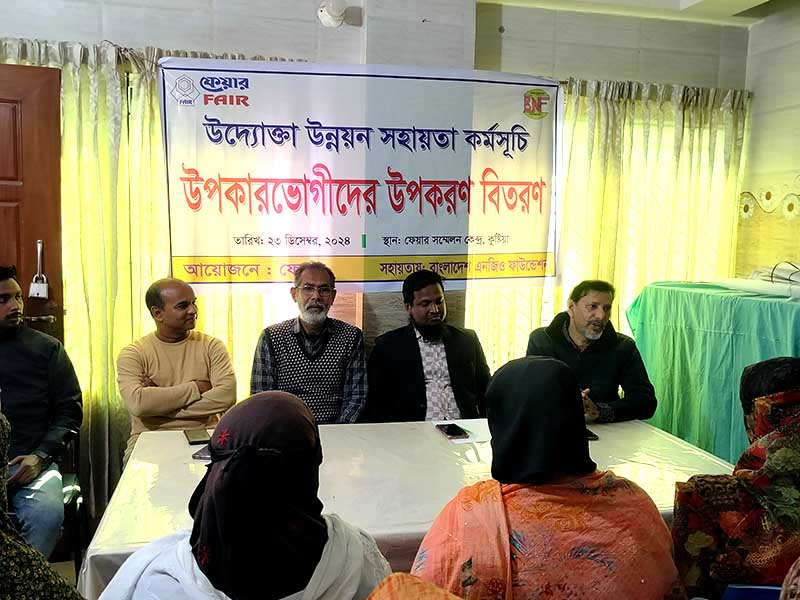Women’s Financial Empowerment: FAIR Distributes Training & Tools to Marginalized Women in Kushtia

Women’s Financial Empowerment in Action: A Ground-Level Initiative by FAIR
Women’s financial empowerment took center stage in Kushtia on December 23, 2024, as the Friends Association for Integrated Revolution (FAIR), with support from the Bangladesh NGO Foundation (BNF), organized a targeted training and tool distribution event for marginalized women — including widows, Dalits, and persons with disabilities.
The event was held under FAIR’s “Entrepreneurship Development Program,” and brought together a distinguished panel of guests, all committed to promoting inclusive economic growth at the grassroots level.
Chief Guest Mr. Ariful Islam, City Officer from the Department of Social Services (DSS), Kushtia, addressed the gathering with a strong message of solidarity, emphasizing the societal importance of empowering women economically.
Mr. Saidur Rahman, Knowledge Management Specialist at Save the Children, shared real-life stories of entrepreneurial success from Thailand to inspire participants.
Mr. Kazi Rafiqul Rahman, Treasurer of FAIR, reinforced the organization’s mission and long-term vision for sustainable empowerment of disadvantaged communities.
Together, their presence underscored a critical truth: when stakeholders from civil society, government, and NGOs unite behind a common goal, women’s financial empowerment becomes a practical and achievable reality.
A Platform for Dignity, Skills, and Inclusion
The event created a collaborative space for learning, sharing, and motivation. Guests applauded the courage of the participating women and encouraged them to use the tools and training to build self-sustaining futures.
Mr. Ariful Islam noted, “Ensuring women’s financial empowerment is crucial for holistic societal progress. FAIR’s initiative is an important step toward that goal. With proper planning and dedication, the women receiving this support can achieve true success.”
Mr. Saidur Rahman complemented this message with practical examples, highlighting two successful women entrepreneurs from Thailand who overcame economic challenges and became valuable contributors to their families and society.
FAIR’s Vision: Economic Justice Through Opportunity
FAIR’s Executive Director Dewan Akhtaruzzaman spoke about the event’s broader purpose:
“Our goal is not only to offer financial tools but to instill the capability and confidence for entrepreneurship. Women’s financial empowerment is the foundation for building an equitable and prosperous society.”
He emphasized the importance of tracking household income, cultivating saving habits, and strengthening women’s roles in family financial planning and business development.
Training for Real-World Challenges
As part of the program, participants received practical training to help them manage and grow their microenterprises. Key training components included:
- Accurate income and expense tracking,
- Budget planning for households and businesses,
- Developing savings habits for financial security,
- Hygiene and cleanliness in business settings,
- Raising awareness about child marriage, education, and community health.
These sessions aimed to equip participants with essential life skills and business acumen, reinforcing the sustainability of their economic activities.
Targeting the Most Marginalized: Who Benefited?
A total of 14 women received targeted business support through the initiative. Beneficiaries were carefully selected from vulnerable groups such as widows, Dalit women, and women with disabilities. Disbursed items included:
- Clothing materials (sarees, three-pieces),
- Food preparation and sale tools (tables, chairs, gas cylinders, cake-making kits),
- Mobile vending vans,
- Barber supplies (professional chairs, mirrors, clippers),
- Other essentials like fans, racks, and stools.
Each tool or resource was selected based on the unique livelihood goals of each participant, ensuring that they could immediately apply them in income-generating activities.
Social Inclusion at the Core
FAIR’s approach prioritizes inclusion. Instead of targeting a generic group, the program deliberately focused on women who often fall outside the radar of mainstream development — including those discriminated against due to caste, widowhood, or disability.
By doing so, the initiative not only addressed gender inequality but also tackled multiple layers of social exclusion.
Empowerment in Action: Community Reactions
One participant shared, “I never thought I could run a business. Now I have tools, training, and support. I believe I can change my life.”
Community leaders present at the event called FAIR’s initiative a “model for inclusive development” that should be expanded nationwide.
The Bigger Picture: FAIR’s Long-Term Commitment
This program is part of FAIR’s ongoing mission to reduce poverty and exclusion through education, training, and advocacy.
The event was organized and facilitated by dedicated FAIR team members: Shawon Ahmed, Tutul Ali, Robin Kumar Das, and Rumana Khatun.
Future activities will include follow-up mentoring, technical assistance, and peer-learning workshops to ensure long-term success for each participant.
Call to Action: Invest in Women’s Financial Empowerment
This initiative by FAIR is a testament to what’s possible when vision, collaboration, and compassion come together. But countless women across Bangladesh still lack access to the tools and training needed to break the cycle of poverty.
● Support FAIR’s ongoing education and entrepreneurship programs.
● Donate tools, fund a woman-led business, or volunteer as a mentor.
● Raise awareness about the importance of inclusive, grassroots development.
“Empower a woman. Transform a community. Inspire a generation.”
